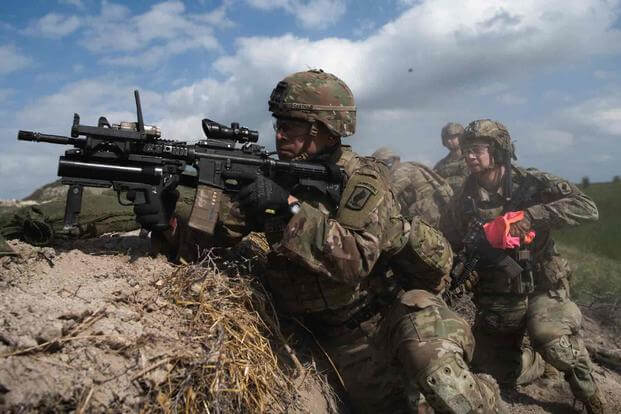The Army will test out new annual evaluations for junior enlisted troops akin to the kind noncommissioned officers get, according to service leaders.
The new evaluations are due to be tested this year, though it's unclear which unit will try out the new approach. In addition to junior soldier evaluations, that unit will also test a policy of conducting counselings quarterly -- with the evaluation being conducted during the fourth quarter in lieu of the counseling.
Broadly, enlisted troops don't have formal evaluations of their annual performance that carry significant weight until they are noncommissioned officers. The proposed junior enlisted evaluation would cover their latest fitness test score, whether they comply with body fat standards, competency in their job, and communication skills, among other metrics.
Read Next: Army Report Shows Increase in Suicides by Active-Duty Soldiers in 2022
Counselings generally provide less formal feedback; often, they are for leaders to get expectations on paper. Army regulations are vague on performance counselings, only directing that soldiers are supposed to receive that feedback in a "timely" manner, though units often conduct them monthly.
"Sometimes we don't [deliver] feedback very well," Command Sgt. Maj. Randolph Delapena, the top enlisted leader for the 82nd Airborne Division, who worked on the proposal, told Military.com. "I think this is going to help us formalize that. It'll help every leader, no matter the level of leadership skills, with a mechanic to give our junior soldiers the ability to better meet their goals."
The idea comes as the service is trying to improve how it develops those in the enlisted ranks, especially its noncommissioned officer corps, long considered the backbone of the U.S. military. Senior enlisted leaders want a better bird's-eye view of their young soldiers and hope that formal evaluations could snowball into developing higher-quality NCOs who are better prepared to take on leadership responsibilities the moment they earn their stripes.
With Gen Z increasingly filling the ranks, Army leaders are finding that the younger generation wants more direct feedback in the workplace. For example, two-thirds of Gen Z surveyed say they need feedback from their supervisor every few weeks and broadly want more communication than previous generations, according to a study from The Center for Generational Kinetics.
But the new emphasis on evaluations could immediately hit skepticism from the rank and file. The Army's company-level NCOs are already buried in administrative tasks, including their own evaluations, a burden that's often worse in the Reserve and National Guard, where time in uniform is limited.
"We took the workload away in a way. If you think about it, you don't have to do monthly counselings," Delapena said. "We're saying [we do] quarterly counselings that form this evaluation at the end. We're proposing this happens at the same time across the Army."
Delapena added that if a soldier is assigned to a new unit and had mental health or other issues the unit should be aware of, the evaluations could help track those issues between units. He said it's rare for a unit to have any information on a new junior soldier and high performers could be identified right away.
However, young soldiers who may have had a rough start in the Army sometimes get second chances at new units. Changing to formal evaluations could torpedo their reputations before they even show up.
"The Army never met a new admin thing it didn't have love at first sight for. I think this'll just be seen as yet more paperwork we have to do," one active-duty infantry sergeant first class told Military.com on the condition of anonymity because they were not authorized to talk to the press. "What if this young [soldier] screws up? We all do. They go to a new unit and might not get a clean slate."
Army leaders plan to review the year-long pilot's results before deciding whether any changes need to be made and whether it's something beneficial for the whole service.
Military.com reported on the Army's new counseling form in March, marking the most significant change to that form in 40 years. The form is dynamic and can change templates on the fly when filled out online for different circumstances, including whether a soldier is being disciplined or recommended for promotion.
Army planners are eyeing numerous initiatives they hope could bolster the quality of the enlisted ranks, including lengthening NCO academics to include more combat training and putting a stronger emphasis on that field time for soldiers outside of combat arms.
-- Steve Beynon can be reached at Steve.Beynon@military.com. Follow him on Twitter @StevenBeynon
Related: Here Is the Army's New Counseling Form, Marking an Overhaul of How the Service Evaluates Soldiers












